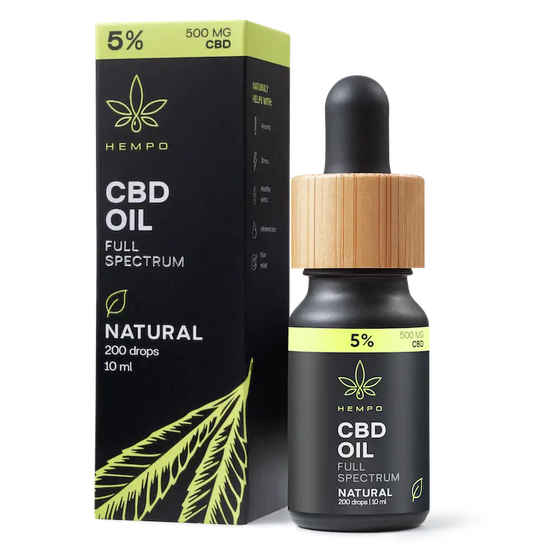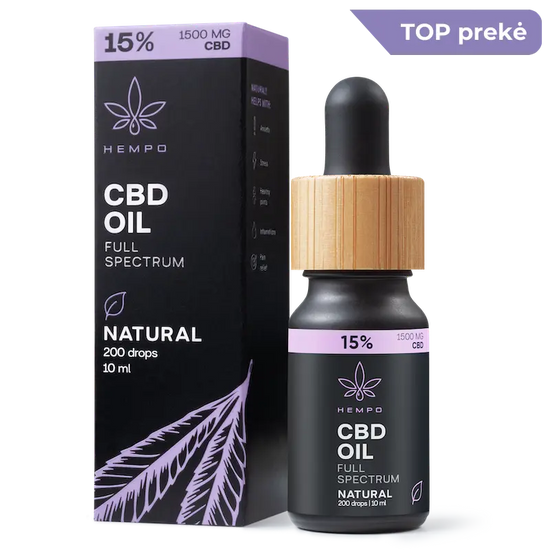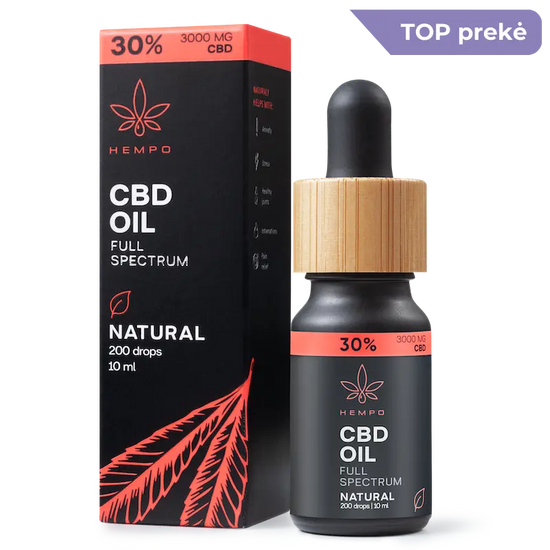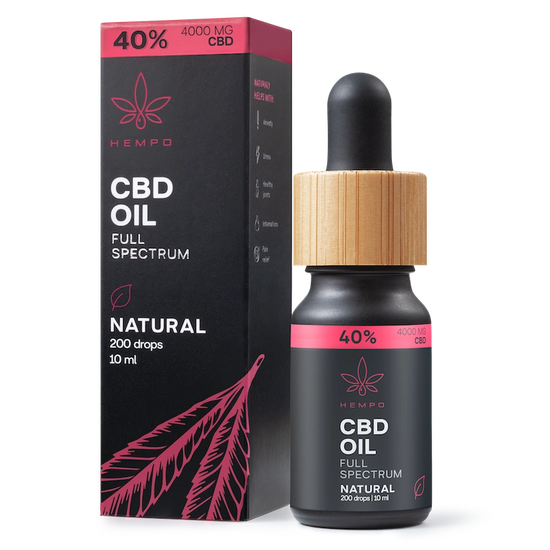THC and CBD: What's the Difference?
Neither cannabidiol (CBD) nor delta-9-tetrahydrocannabinol ( THC) are new discoveries - scientists first isolated them from hemp plants back in the early forties. However, our knowledge and understanding of these two compounds is still evolving as scientists continue to study them, learning more about their medicinal properties and benefits.
Education about the hemp plant and its two main compounds has not only increased their popularity, but has also brought them into mainstream practice in recent years. Read on to learn more about the similarities and differences between CBD and THC, their benefits for the body, potential side effects, and how they are treated by legal systems around the world.
Table of Contents

Note: This and other articles on Hempo's blog are for informational purposes only. According to the directive of the European Commission, cannabidiol is classified as a 'novel food', therefore CBD products should not be used as a food supplement in Lithuania.
What is CBD?
Cannabidiol, or CBD, is one of the main cannabinoids (chemicals characteristic of hemp) found in seed hemp.
Hemp seeds (Cannabis sativa) can be classified according to their CBD and THC production potential:
Type I seeds contain more than 0.3% THC and less than 0.5% CBD.
Type II seeds contain more than 0.3% THC and 0.5% CBD.
Type III seeds contain less than 0.3% THC and more than 0.5% CBD.
Type I and II seeds are considered marijuana (the drug plant), while type III seeds are for ordinary hemp (which can be grown in all EU countries).
CBD can be obtained from any type of Cannabis sativa plant, but in most countries of the world it is only legal when extracted from ordinary hemp - this important difference will be explained in more detail later.
CBD is related to THC, but it does not produce the psychoactive effects commonly associated with THC.
CBD comes in many forms, including oil, extracts, patches, e-liquid, gels, lotions, gum, etc. CBD is said to have a variety of health benefits. Cannabidiol is also the active ingredient in Epidiolex, the first drug made from a component of the hemp plant to be approved by the FDA for the treatment of epilepsy. material.
What is THC?
THC is delta-9-tetrahydrocannabinol, the main psychoactive substance of the cannabis plant. It is this that causes the psychoactive effects of smoking marijuana or eating foods that contain high levels of THC.
Marijuana and other THC-containing products are classified as Schedule 1 controlled substances by the US Drug Enforcement Agency (DEA) and are therefore not currently used medically, despite the fact that medical marijuana is legal in some states.
THC usually comes in three forms: flowers, hashish, and hashish oil. The ring form is the most popular - it is made from dried cannabis leaves and flowers or buds, which are usually smoked or added to food and drinks.
Hashish is a solid or paste-like substance produced by compressing or refining the resin of cannabis buds. Hashish oil - its strongest form - is produced by extracting the purest hashish resin.
The permitted THC content in plants and other products in EU countries must not exceed 0.2-0.3%.
How are CBD and THC extracted?
CBD and THC are extracted from the same type of plant - "Cannabis sativa", but there are fundamental differences between them.
CBD is extracted from type lll seed hemp (Cannabis sativa) with a THC content of less than 0.3%. Cannabis plants with a THC concentration of more than 0.3% are considered marijuana (cannabis that is prohibited).
THC and CBD are derived from the resin found on the leaves and flowers of the female hemp plant.
Synthetic cannabinoids, also called synthetic marijuana, Spice or K2, are industrially produced chemicals that mimic the effects of THC. The psychoactive components of these substances have different effects than THC and can cause unwanted effects.
Chemical structure of CBD and THC
CBD and THC have the same molecular formula - 21 carbon atoms, 30 hydrogen atoms and 2 oxygen atoms. However, the atomic arrangement of CBD and THC is different, so they have different chemical properties and unique effects on the body.
How CBD and THC affect the body
When using CBD and THC, each of these compounds produces different effects in the body. A detailed analysis of these effects follows.
Effects of CBD
Research by scientists reveals that CBD may have several therapeutic applications for the human body, acting at the molecular level. Although the mechanism of action of CBD is still not fully understood, it is believed that it can modulate the signals sent by the brain, reduce inflammatory processes in the brain and change calcium levels in neurons, which is important in cellular communication.
One of the biggest challenges with CBD products is the uncertainty surrounding their ingredients. Many CBD products, especially in the US, are not regulated by official bodies such as the FDA, which raises questions about their purity and safety. Studies have shown that some CBD products may contain less CBD than stated or even be mixed with THC.
This poses the threat of unexpected positive drug test results. For this reason, the FDA has expressed concern and encourages consumers to exercise caution when purchasing and using CBD products.
THC Effects
THC, found in the marijuana plant, affects the hemispheres of the brain responsible for the sensation of pleasure. It stimulates the release of the 'feel-good' hormone - dopamine - resulting in feelings of relaxation and euphoria.
The concentration of THC in marijuana can vary greatly. The higher the concentration of THC, the stronger its effect on the body. Modern marijuana strains are significantly stronger than before, with an average THC concentration of around 15%, compared to around 4% in the mid-20th century.
High concentrations of THC can have negative effects on the mental health of users, causing states such as hallucinations, delusions or even psychosis.
Benefits of CBD and THC
People use CBD and THC in hopes of relieving a variety of physical and mental health conditions. Although more research is needed to fully evaluate this, some studies (and human testimonials) suggest that CBD may help:
- Reduce anxiety and depression;
- Improve sleep quality;
- Reduce inflammation;
-
Reduce nerve and chronic pain;
- Strengthen the immune system;
- Improve blood circulation activity;
Speaking of THC, scientists are currently investigating whether it can benefit from:
- Muscle stiffness and spasms in multiple sclerosis (ALS);
- Chronic pain or nerve pain;
- Epilepsy or convulsions;
- Tremor caused by Parkinson's disease;
- Nausea;
- Glaucomas;
- For appetite stimulation in people with HIV/AIDS;
- Alzheimer's diseases;
- Crohn's disease;
- Post-traumatic stress disorder (PTSD) symptoms.
However, marijuana research is hindered by the strict regulation of this substance. Because THC is still classified as a Schedule I drug, researchers must follow local laws when conducting research.
CBD and THC for anxiety
Some animal studies show that CBD can help reduce anxiety-like behavior in animals. However, we still need more research to see if this response can be applied to humans. A small study found that sleep quality improved and anxiety decreased in participants who took CBD, but more research is needed to confirm the findings.
One study compared medical marijuana, CBD, and a placebo (dummy drug) to treat anxiety in veterans with PTSD. The study found that symptoms improved significantly in all three groups.
Another study found that lower doses of THC may reduce anxiety in some users, but higher doses may increase anxiety in some people. Therefore, it is believed that the small amount of THC (up to 0.2%) found in CBD products contributes to the anxiety-relieving sensation.
CBD and THC side effects
THC consumption can cause:
- Problems with concentration and memory;
- Dizziness;
- Respiratory disorders;
- Rapid heart rate;
- Nausea and vomiting;
- Drowsiness;
- Loss of balance.
CBD side effects may include:
- Fatigue;
- Drowsiness;
- Low blood pressure.
CBD can also cause changes in the way some medications work. Be sure to consult a medical professional if you are using CBD or THC.
Legality of CBD and THC in Europe
In Europe, the legal status of hemp, which produces CBD, and marijuana, which contains THC, is complex and varies between countries.
Hemp-derived CBD is legal in most European countries, but its legal status depends on each country's laws. In most EU countries CBD products are legal if they meet certain requirements, e.g., low THC level. For example, in many member states of the European Union CBD is legal if the amount of THC in it does not exceed 0.2%.
On the other hand, products containing THC are usually illegal or heavily regulated due to their psychoactive properties. Medical use of marijuana is legal in some European countries, but recreational use is generally prohibited. For example, the Netherlands is known for its liberal policy on marijuana, but even there, recreational marijuana use is only allowed in certain licensed cafes.
European Union legislation regarding hemp and its derivatives is still a developing area and new regulatory changes can appear at any time. For example, the Court of Justice of the European Union in 2020 decided at the end that CBD is not a drug and that member states cannot ban its trade if it is produced in accordance with the legislation in force.
There is currently a debate in the European Union regarding the liberalization of hemp regulation, especially in the field of medical use. However, to date, the legalization of THC-containing products for recreational purposes is limited and depends on each country's laws.





